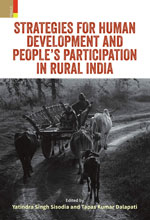As India inches close to 75th anniversary of Independence, self-introspection about hurdles it has to overcome in policy and implementation domain needs to be debated. The book under review brings together fourteen well-researched papers based on field-level experiences of States across the country, interrogating critical dimensions of rural human development in contemporary India that need attention for percolation of developmental benefits to every corner of India. For that to happen, the editors argue in the introduction for ‘enlarging of choices…(to have) an appropriate balance between capabilities and opportunities’ (p. 2). For a methodical analysis of rural people’s actual participation in planning and implementation process of human development programmes, the editors have arranged the papers into four sections, viz., contemporary perspectives; prospects and challenges; impacts and challenges of initiatives and challenges for people’s participation.
Drawing on experiences of Kerala and Tamil Nadu of viewing rural human development as a process-oriented rather than a target-oriented task, G Palanithurai in his essay charts out a roadmap for increasing connectivity between higher learning institutions and communities at district level to ensure the ‘you govern, you participate’ approach so that ‘human development and well-being become people’s subjects and not only of experts’ (p. 16).

